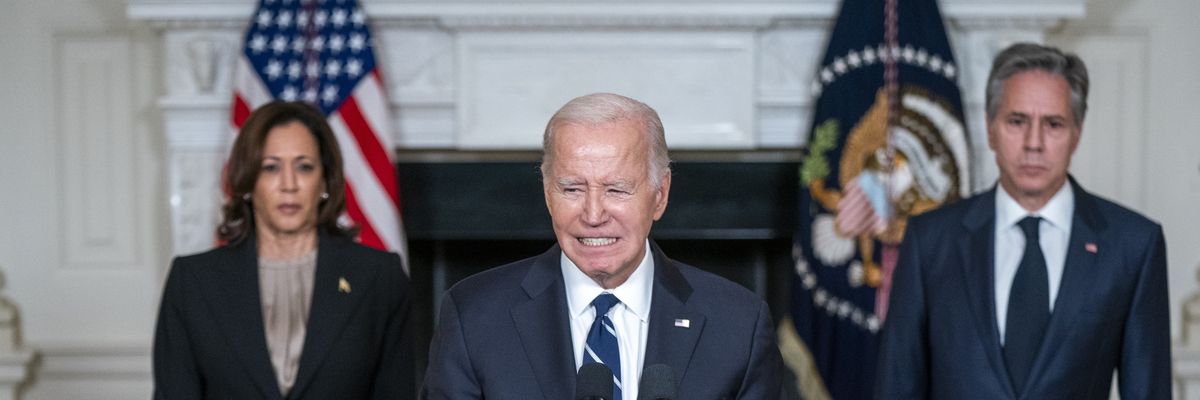The United States has committed support to the Israeli effort to rescue its hostages in Gaza, according to President Joe Biden in televised remarks to the nation on Tuesday afternoon.
In an emotional speech, the president said there were 14 Americans dead and a number of American hostages among the 150 reported taken by Hamas in the attacks.
“I'm directing my team to share intelligence and deploy additional experts from across the United States government to consult with and advise Israeli counterparts, hostage recovery, and recovery efforts,” he said. “Because as president, I have no higher priority than the safety of Americans being held hostage around the world.”
In an earlier report, Sky News said it had confirmed that the Pentagon was sending “hostage rescue support” to Israel. It would be “intelligence support, it will be logistical support,” but “at a distance.” No boots on the ground, said SkyNews reporter Mark Stone early Tuesday afternoon before Biden’s remarks.
Earlier Tuesday, when talking to CNN about the hostage-taking, Israel’s Minister for Strategic Affairs Ron Dermer said “there’s also American hostages as part of that number as well.” An exact number has yet to be confirmed.
In his remarks, Biden also said it would be “surging additional military assistance including ammunition and interceptors to replenish Iron Dome. We're going to make sure that Israel does not run out of his critical assets to defend its cities and its citizens.”
On Monday, the Washington Post reported that the administration may try to roll Israel aid in with the Ukraine aid it wants Congress to pass by the end of the year. He did not provide any details about the level of aid or how he would present it to Congress in his remarks, however.
Where he was light on details, he was strong in affirming his disgust with the wave of Hamas attacks, which began over the weekend. Though numbers are still unverified, reports said Tuesday afternoon that the death toll was nearing 1,008 Israelis and 770 Palestinians.
“The blood thirstiness brings to mind the worst rampages of ISIS,” Biden said. “This is terrorism. But sadly for the Jewish people, it's not new. This attack is brought to the surface painful memories and the scars left by a millennia of anti-semitism and genocide, the Jewish people in this moment, we must be crystal clear. We stand with Israel. We stand with Israel.”
Hamas, Biden added, “does not stand for the Palestinian people's right to dignity and self determination.”
“This is what they mean by human tragedy — atrocity on an appalling scale. We're going to continue to stand united supporting the people of Israel who are suffering unspeakable losses, and opposing the hatred and violence of terrorism.”
Israel has called up 300,000 reservists and appears to be readying for a ground invasion of Gaza, which has been slammed by Israeli retaliatory missile strikes against Hamas over the last 72 hours, with nearly 200,000 residents displaced as of Tuesday, according to the UN. Israel's defense minister ordered a cut-off of all food, water and electricity to Gaza, which is already under a blockade. According to ABC News, more than 73,000 people were sheltering in schools as of Tuesday morning, while Gaza's main hospital, Beit Hanoun Hospital, was damaged and is now out of service.
Biden did not mention the unfolding civilian crisis in Gaza, but emphasized the assistance to Israel in its war against Hamas in Gaza moving forward. He said, too, that his administration is addressing any potential for domestic threats. “The Department of Homeland Security, Federal Bureau of Investigation are working closely with state local law enforcement and Jewish community partners to identify and disrupt any domestic threat that could emerge in connection with these horrific attacks,” he said.
Biden did not mention Iran, or what role it might have played in resourcing Hamas’s attacks. But he did note the deployment of the USS Gerald R. Ford Carrier group to the Eastern Mediterranean, which was announced Monday. Observers say this is not only a show of commitment to Israel’s security, but a show of force in the region, with a particular nod to Iran. “We stand ready to move in additional assets as needed,” Biden added.
- How to avoid a wider Mideast conflict ›
- Biden readying emergency weapons aid for Israel ›
- Presidential hopefuls try to outdo each other on Hamas, Israel war - Responsible Statecraft ›
- Danger for US deepens as Gaza crises escalates - Responsible Statecraft ›
















